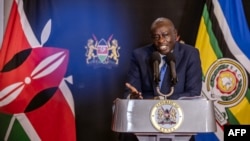Kenya's embattled Deputy President Rigathi Gachagua is reportedly at the hospital on the day he was scheduled to testify at his own impeachment trial.
Proceedings were suspended but would resume around 5pm local time according to the speaker of the Senate Amason Kingi. Kingi told the chamber he expects the deputy president to take the stand because he says this is "a time bound process… it is so ordered."
Gachagua has pleaded not guilty to all allegations against him including corruption, inciting ethnic divisions and support for anti-government protests that saw demonstrators storm the country's parliament. He could be the first sitting deputy president impeached in Kenya.
The case highlights the friction between him and President William Ruto — something that Ruto once vowed to avoid after his past troubled relationship as deputy to Kenya's previous president, Uhuru Kenyatta.
Gachagua has said he believes the impeachment process has Ruto's blessing, and has asked legislators to make their decision "without intimidation and coercion."
The tensions risk introducing more uncertainty for investors and others in East Africa's commercial hub.
Court rulings this week allowed the parliament and senate to proceed with the impeachment debate, despite concerns over irregularities raised by the deputy president's lawyers.
The impeachment motion was approved in parliament last week and forwarded to the senate. Gachagua's legal team will have Wednesday and Thursday to cross-examine witnesses, and the senate will vote Thursday evening.
The senate requires a two-thirds majority to approve the impeachment motion.
Under the Kenyan Constitution, the removal from office is automatic if approved by both chambers, though Gachagua can challenge the action in court — something he has said he would do.
Kenya's president has yet to publicly comment on the impeachment process. Early in his presidency, he said he wouldn't publicly humiliate his deputy.
Ruto, who came to office claiming to represent Kenya's poorest citizens, has faced widespread criticism for his efforts to raise taxes in an effort to find ways to pay off foreign creditors. But the public opposition led him to shake up his cabinet and back off certain proposals.
VOA’s Mariama Diallo contributed to this report from Nairobi.




